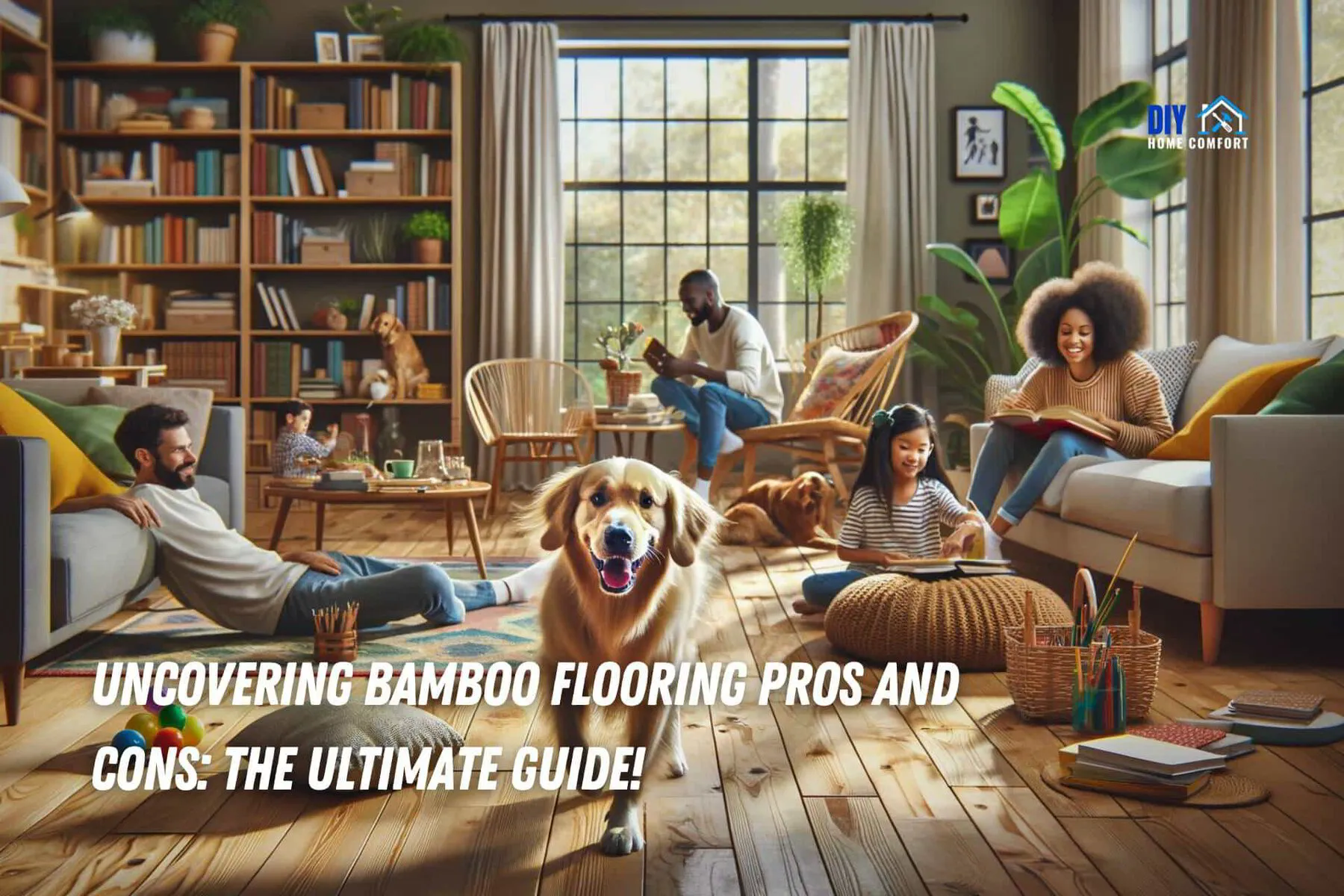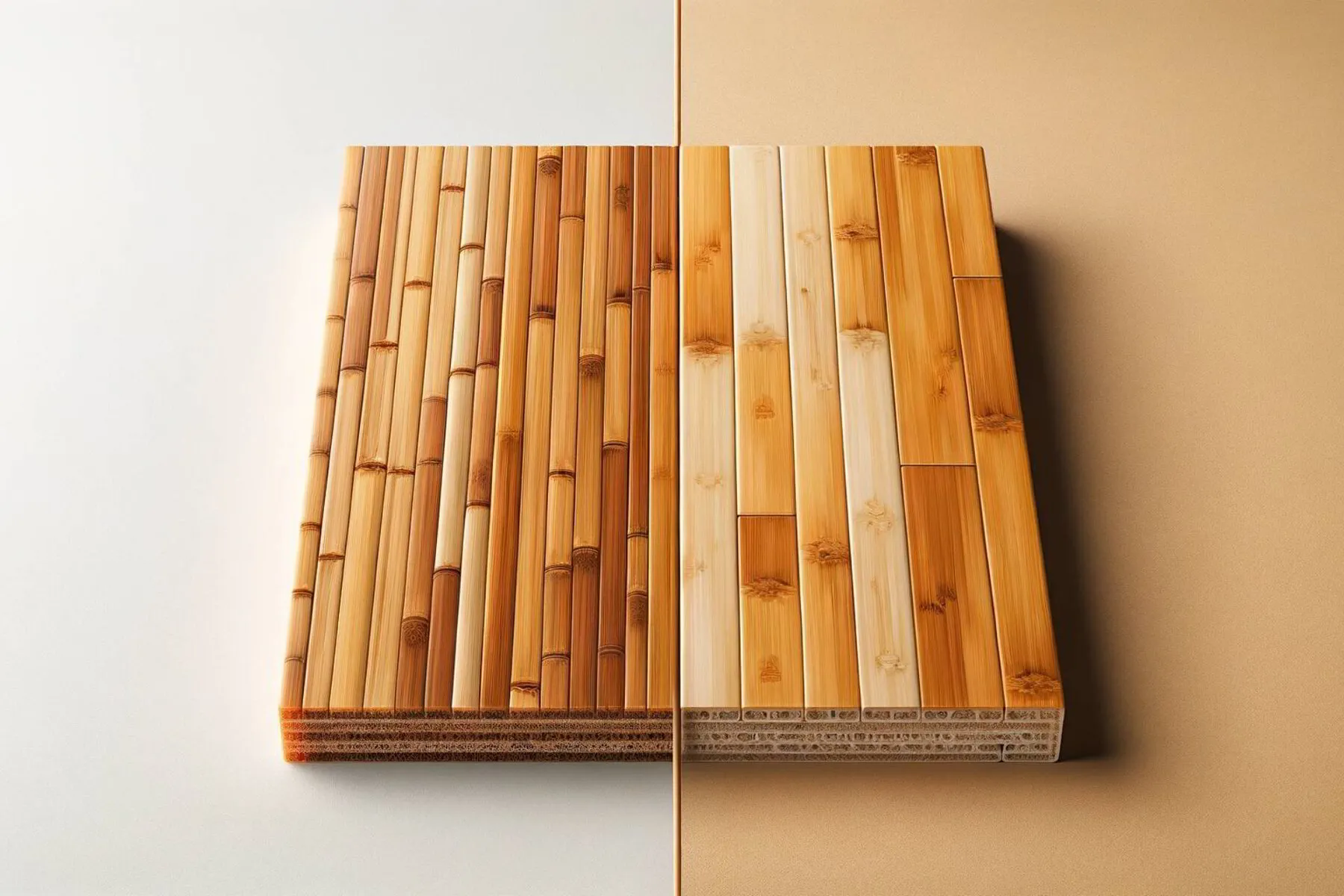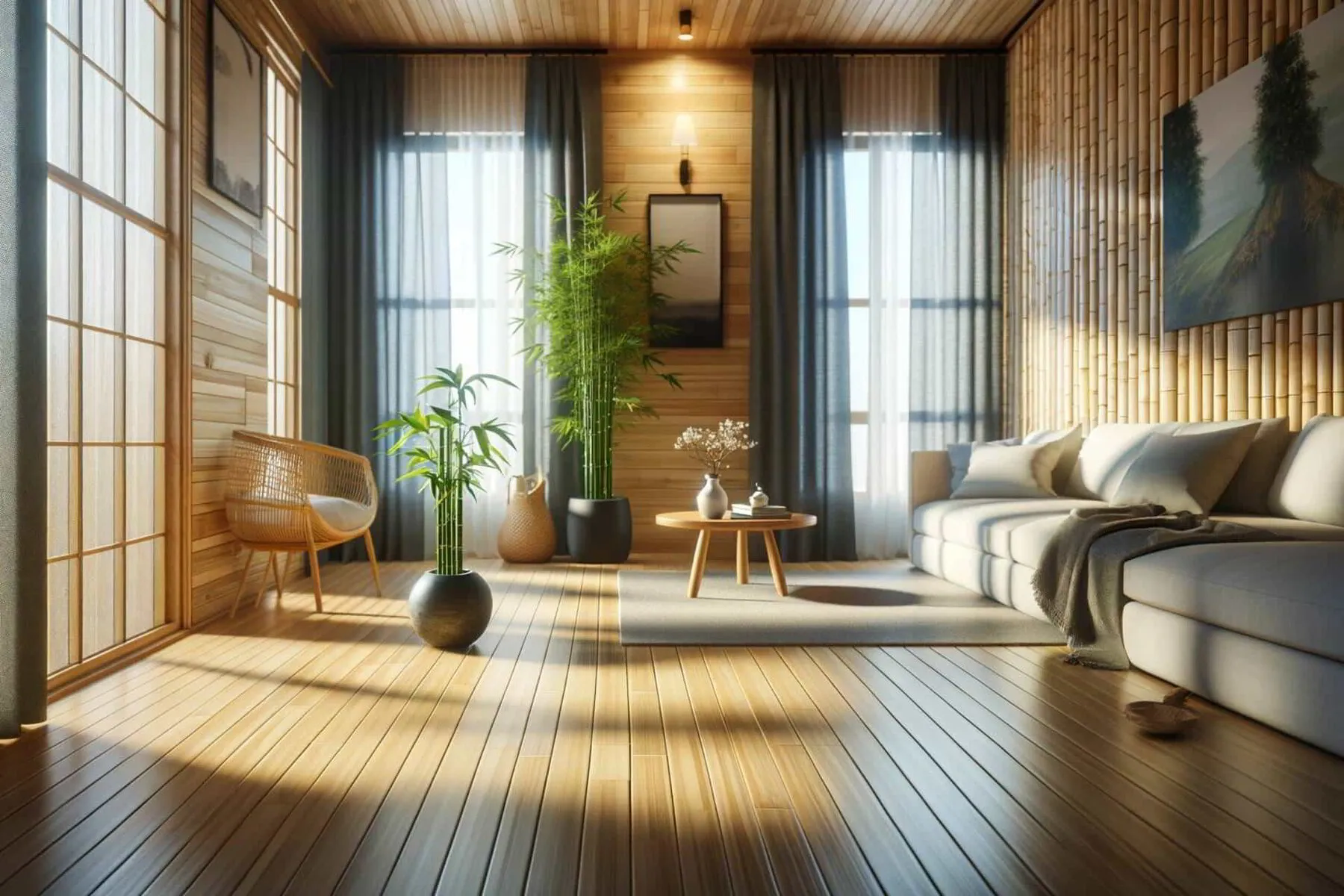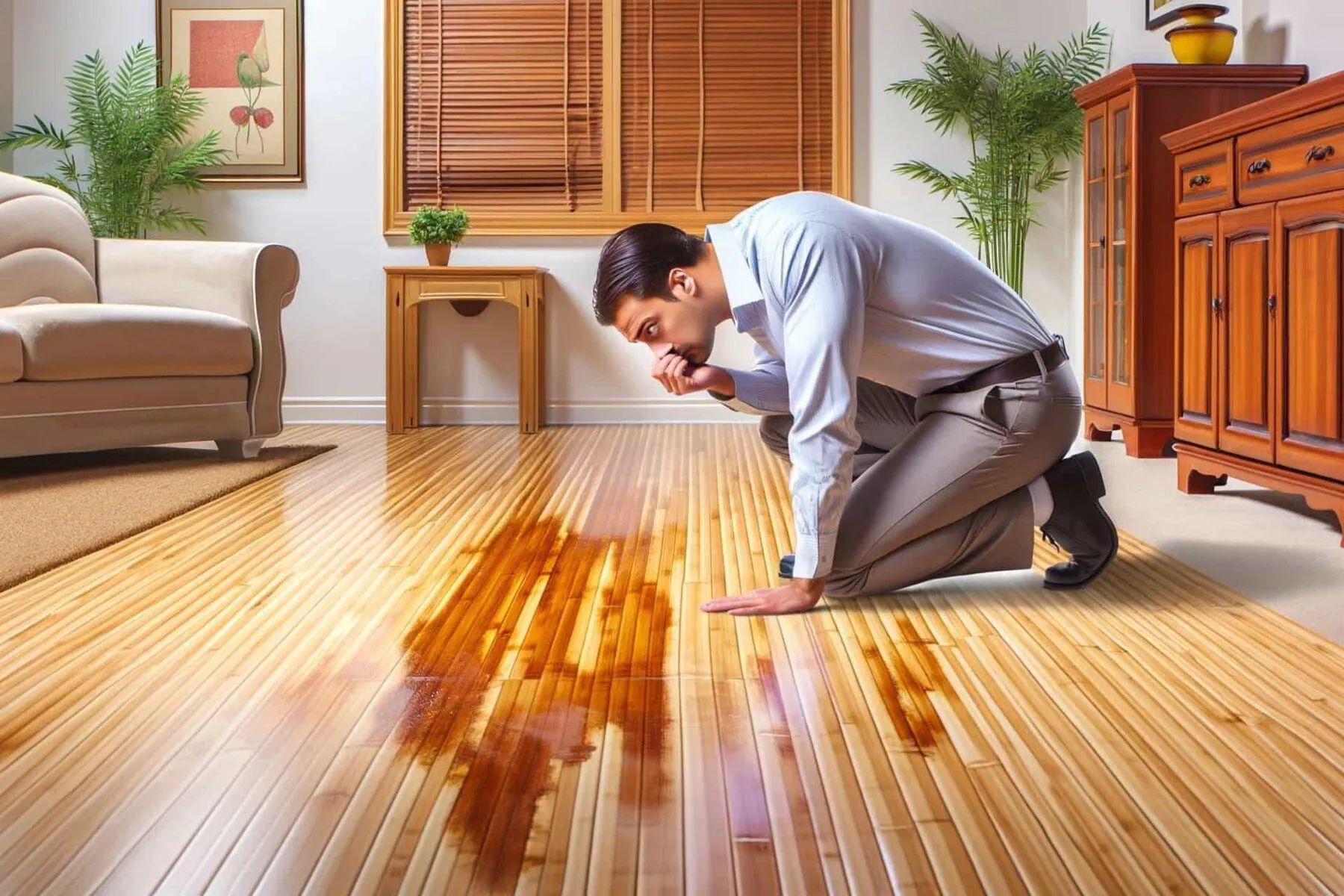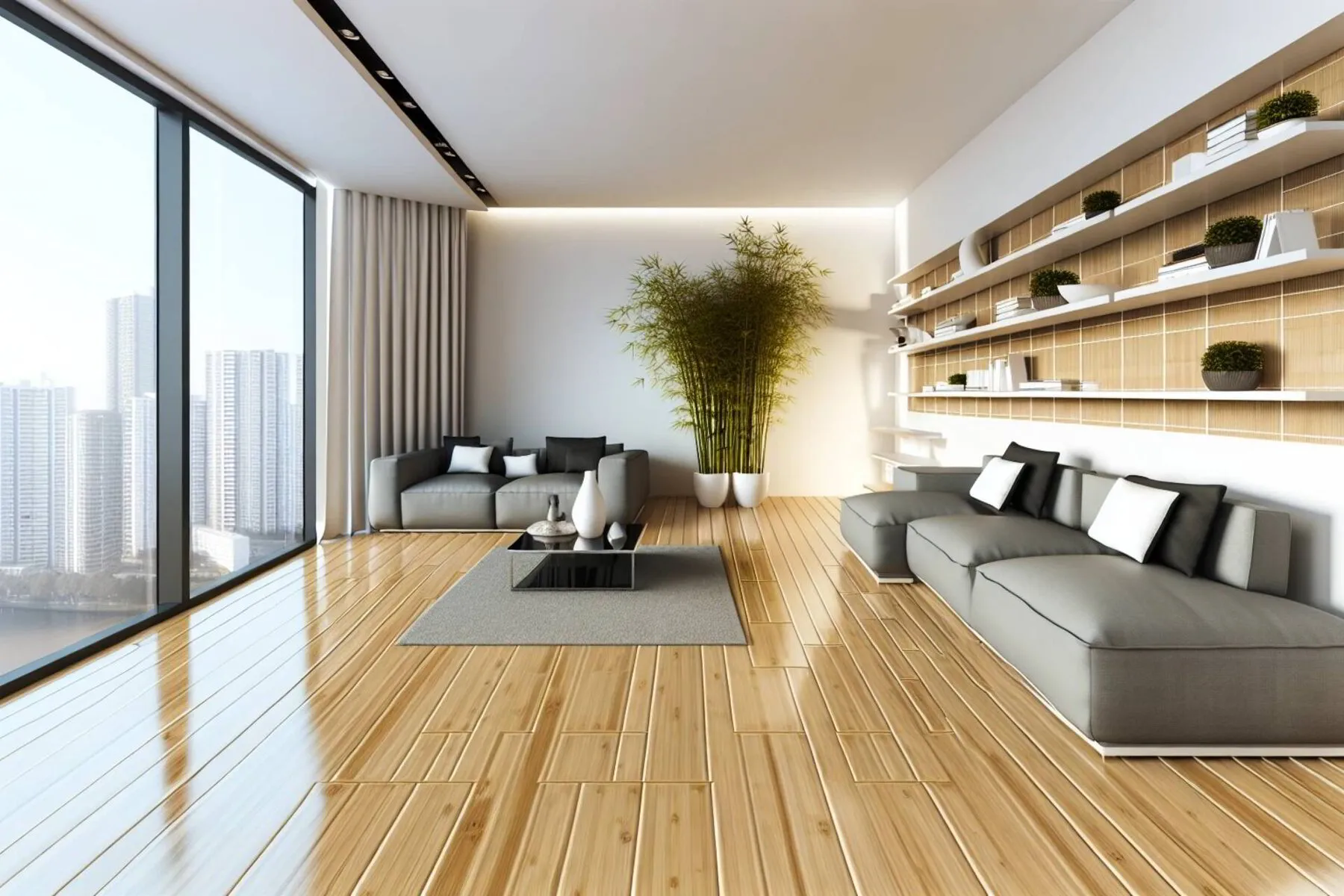Are you seeking an eco-friendly, durable, and stylish alternative to traditional hardwood flooring? Enter the world of bamboo flooring, a versatile option that’s gaining popularity among homeowners and designers alike.
This comprehensive guide will explore the various types of bamboo flooring, their benefits and drawbacks, and important factors to consider when selecting the perfect flooring for your home.
Let’s dive into the bamboo flooring pros and cons to help you make an informed decision.
📘 Key Takeaways
- Bamboo flooring offers a sustainable, durable and aesthetically pleasing alternative to hardwood at a fraction of the cost.
- Quality is essential for durability and longevity. Bamboo flooring can be finished with various styles for customization.
- Costs vary based on type, manufacturing method & quality - ranging from $3-$16 per square foot.
Understanding Bamboo Flooring
Bamboo flooring is more than just an alternative to hardwood flooring; it’s an eco-friendly, durable, and versatile choice made from the fast-growing Moso bamboo plant.
With a wide array of types, finishes, and styles to choose from, bamboo flooring offers something for everyone.
However, evaluating the pros and cons of bamboo flooring aids in deciding if it’s suitable for your home.
What is Bamboo Flooring?
Bamboo flooring is made from bamboo grass, providing a similar aesthetic to hardwood floors, and is available in solid and engineered forms.
It’s created by a meticulous process that involves:
- Boiling
- Steaming
- Drying
- Slicing
- Shredding
- Weaving
- Pressing with resin binders, glues, and heat to form the flooring boards.
High-quality bamboo flooring can rival the durability of traditional hardwood flooring, but choosing from a range of bamboo flooring products is key to ensuring a high-quality bamboo floor and its longevity. With the increasing popularity of bamboo floors, selecting the right product for your needs is essential.
Bamboo vs. Hardwood Flooring
At first glance, bamboo and hardwood flooring may seem quite similar, given their comparable appearance and upkeep.
However, bamboo sets itself apart due to its sustainability and renewability. With a Janka rating of approximately 1,825 for horizontal and vertical bamboo flooring and 3,270 for strand-woven bamboo flooring, bamboo is harder than many hardwoods, making it a durable and attractive option for homeowners.
Strand-woven bamboo, in particular, offers the same aesthetic and resilience as Brazilian hardwoods but at a fraction of the cost.
In addition, the Moso bamboo plant's rapid growth and regenerative nature, with its bamboo stalks, make it an environmentally friendly choice for those looking to reduce their carbon footprint while enjoying the timeless appeal of wood flooring.
Types of Bamboo Flooring
Bamboo flooring is available in various forms, including solid, engineered, and different manufacturing methods like horizontal, vertical, and strand-woven.
Each type possesses unique characteristics and benefits, so understanding the differences is key to selecting the best option for your needs and preferences.
Solid Bamboo Flooring
Solid bamboo flooring offers several advantages:
- Increased durability
- Capability of being refinished multiple times
- More authentic appearance
- Environmental friendliness
- Stability
However, choosing a reputable manufacturer who follows proper manufacturing practices is key to ensuring the quality and durability of solid bamboo flooring, as the manufacturing process can significantly impact its appearance and performance.
Engineered Bamboo Flooring
Engineered bamboo flooring, a type of engineered wood floor, incorporates a thin top layer of bamboo adhered to a high-density fiberboard or plywood base.
These engineered planks offer increased resistance to moisture and humidity compared to solid bamboo flooring, making them a better choice for areas with fluctuating moisture levels. Solid bamboo planks, on the other hand, are more susceptible to moisture-related issues.
However, selecting a high-quality product is key to ensuring the longevity and performance of the engineered bamboo flooring.
Horizontal, Vertical, and Strand-Woven Bamboo Flooring
Horizontal bamboo flooring features 14-by-34-inch bamboo strips adhered edge-to-edge, with the skin side facing up to showcase the nodes or “knuckles” for a classic bamboo aesthetic.
On the other hand, vertical bamboo flooring is created by aligning bamboo strips vertically, with the narrow sides facing upwards, producing a unique and sophisticated look with the natural grain of the bamboo visible on the surface.
Strand-woven bamboo flooring is manufactured through the following process:
- Soaking bamboo strips in adhesive
- Laying them out lengthwise in various orientations
- Compressing them in giant hydraulic presses to create a solid rectangular mass
- Milling the mass into floorboards
Notably denser and harder than other types of bamboo flooring, strand-woven bamboo offers exceptional durability and resistance to scratches and dents. This makes it an ideal choice for high-traffic areas and households with pets.
The Pros of Bamboo Flooring
There are several advantages to choosing bamboo flooring for your home, including its eco-friendliness, durability, and allergy-friendly properties.
As a sustainable and renewable resource, bamboo flooring is an excellent choice for environmentally conscious homeowners.
Its durability and scratch resistance make it suitable for high-traffic areas, while its hypoallergenic nature is beneficial for those with allergies or sensitivities.
Eco-Friendliness
Bamboo is a sustainable and renewable resource, making it an eco-friendly flooring option. As a rapidly growing grass that requires minimal water and no fertilizers, bamboo is considered a more environmentally friendly choice compared to traditional wood flooring.
By choosing bamboo flooring, homeowners can reduce their environmental impact while enjoying the aesthetic appeal of wood flooring.
Durability and Scratch Resistance
Bamboo flooring is renowned for its durability and scratch resistance, making it an excellent choice for households with pets and high-traffic areas. Strand-woven bamboo, in particular, is harder than most hardwoods and offers increased resistance to scratches and dents.
However, proper maintenance of bamboo flooring is important to prevent damage and ensure its longevity.
Allergy-Friendly
Bamboo flooring is an allergy-friendly option, repelling dust and pollen, making it ideal for homeowners with allergies.
Its smooth surface is easy to clean, and its natural resistance to dust, mold, and mildew makes it an excellent choice for those looking to minimize allergens in their homes.
The Cons of Bamboo Flooring
Despite its numerous benefits, bamboo flooring is not without its drawbacks. Some potential concerns include variability in quality and hardness, sensitivity to moisture and humidity, and possible toxins in low-quality products.
Considering these factors is important when deciding if bamboo flooring is suitable for your home.
Quality and Hardness Variability
The quality and hardness of bamboo flooring can vary depending on the manufacturing process, type of bamboo, and the supplier.
Choosing a reputable dealer and high-quality product is key to ensuring the durability and performance of your bamboo flooring.
This can help avoid issues such as bending or breaking of the floor planks due to inadequate density or moisture content.
Sensitivity to Moisture and Humidity
Bamboo flooring is sensitive to moisture and humidity, making it unsuitable for humid rooms or bathrooms. Exposure to standing water or excessive moisture can cause swelling, warping, or discoloration of the floor planks.
To minimize these risks, it is important to install and maintain bamboo flooring correctly and avoid its use in areas with high humidity.
Potential Toxins
Low-quality bamboo flooring may contain harmful resins and toxins due to the adhesive used during the manufacturing process. The adhesive may contain urea-formaldehyde, which can emit toxic fumes.
To avoid potential health risks, choosing high-quality bamboo flooring with low or no Volatile Organic Compounds (VOC) adhesives and seeking independent certifications like GreenGuard or FloorScore is important.
Bamboo Flooring Finishes and Styles
Bamboo flooring can be finished in various ways, including factory, oil, and unfinished, each with its own benefits and drawbacks.
The type of finish you choose can affect the overall appearance and performance of your bamboo flooring, as well as the ease of maintenance and potential for customization.
Factory vs. Oil vs. Unfinished Bamboo Flooring
Factory-finished bamboo flooring is:
- Durable and long-lasting
- Has a protective finish applied in a factory setting before being made available for purchase
- Offers exceptional durability
- Ideal for high-traffic areas
- Resistant to daily wear and tear
On the other hand, oil-finished bamboo flooring offers a vintage look with a wax-based coating that replicates the appearance of a hand-applied oil. This finish has a more muted visual effect and is often applied over a distressed texture for added character.
Unfinished bamboo flooring allows for custom staining after installation, giving homeowners the opportunity to personalize their flooring to match the overall aesthetic of their space.
While this option offers greater customization, it’s important to note that on-site finishes typically do not provide the same level of durability as factory-applied finishes and may require more frequent maintenance.
Bamboo Flooring Installation and Maintenance
Installing and maintaining bamboo flooring is similar to hardwood flooring, with various installation methods and maintenance tips to keep your floors looking their best.
Understanding the proper techniques for installation and upkeep can help prolong the life of your bamboo flooring and maintain its appearance and performance.
Installation Methods
Bamboo flooring can be installed using nail-down, glue-down, or floating floor methods, depending on the specific product and your personal preferences. DIY-friendly options like click-lock systems are also available, allowing for an easier and more efficient installation process.
Before installing bamboo flooring, consulting the manufacturer’s guidelines and choosing the appropriate method for your specific needs and flooring type is important.
Maintenance Tips
Maintenance of your bamboo flooring is key to ensure its longevity and keep it looking its best.
Here are some tips to follow:
- Regularly sweep and vacuum your floors to prevent scratches and damage from debris.
- Occasionally mop your floors with non-wax, non-alkaline cleansers to keep them clean and fresh.
- Avoid using ammonia-based or acidic cleaners, as these can damage the finish and potentially harm the bamboo flooring.
By following these maintenance tips, you can keep your bamboo flooring in great condition for years to come.
By following these maintenance tips, you can enjoy the beauty and durability of your bamboo flooring for years to come.
Cost Considerations for Bamboo Flooring
When considering the bamboo flooring cost, it’s important to note that it can vary depending on factors such as the type, manufacturing process, and quality of the product.
With prices ranging from $2 to $11 per square foot, bamboo flooring offers an affordable alternative to traditional hardwood flooring without sacrificing durability or style.
Understanding the factors that affect bamboo flooring costs aids in making a decision and choosing the best option for your budget and needs.
Price Range
The cost of bamboo flooring can range from affordable to expensive, depending on factors such as the type of bamboo, manufacturing method, and quality of the product.
Solid bamboo flooring typically ranges from $7 to $16 per square foot, while engineered bamboo flooring is generally more affordable. Strand-woven bamboo flooring, known for its durability and unique appearance, is priced at $3 to $5 per square foot.
When comparing costs, considering factors beyond the initial purchase price, such as installation and maintenance costs, is important.
Factors Affecting Cost
Several factors can affect the cost of bamboo flooring, including the type of bamboo used, the manufacturing process, and the quality of the product.
For example, engineered bamboo flooring is generally more affordable than solid bamboo flooring, but it may not be as durable or can be refinished.
Additionally, the quality of the manufacturing process and the materials used can impact the overall cost of bamboo flooring.
Understanding these factors aids in deciding and finding the best bamboo flooring option for your budget and needs.
Summary
In conclusion, bamboo flooring is a versatile, eco-friendly, and durable alternative to traditional hardwood flooring.
With a wide range of types, finishes, and styles, it’s ideal for homeowners looking to make a sustainable and stylish statement in their living spaces.
As with any flooring option, it’s essential to consider the pros, cons, and factors, such as cost and maintenance, to ensure you make the best decision for your home.
Bamboo flooring can provide a beautiful and long-lasting foundation for your living spaces with the proper care and attention.
📘 Related Reading: The 7 Elements of Interior Design
Lara Harding
Lara is a supporting author @ DIY Home Comfort. She's an experienced interior designer and decorator and a full-time mom. You can find out more about her here.
Frequently Asked Questions
What are the disadvantages of bamboo flooring?
Bamboo flooring is prone to water damage, shrinking, warping, buckling, dents, scratches, fading, and discoloring over time. It is also vulnerable to humidity.
What is the lifespan of bamboo flooring?
Bamboo flooring typically lasts 10 to 25 years. While hardwood flooring can last up to 75-100 years, the hard surface layer of bamboo floorboards is relatively thin and cannot be sanded and refinished as often, reducing its longevity. Humidity in the environment can also lead to warping of both types of flooring.
What happens when bamboo flooring gets wet?
Bamboo flooring can withstand some moisture; however, if excessive water is allowed to soak into the planks, it can cause warping, distortion and discoloration.
Are bamboo floors high maintenance?
Bamboo floors require regular cleaning with a bamboo floor cleaner or mild soap and water solution, as well as sweeping and vacuuming to remove dust and debris. Area rugs can help protect them from wear and tear, but they should also be shaken out and cleaned regularly. While bamboo floors may require more maintenance than other types of flooring, they are relatively easy to maintain.
Is bamboo wood?
Bamboo is not classified as wood but is actually a type of grass. It is used in many products typically made with wood, such as furniture and flooring, and can be harvested from the bamboo forest when mature to create firm and rigid material.
